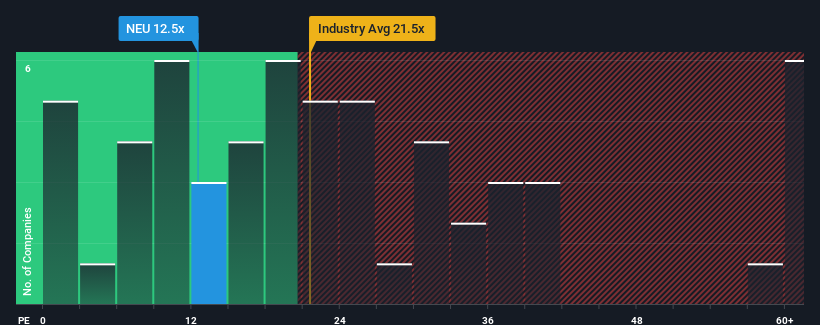- United States
- /
- Chemicals
- /
- NYSE:NEU
Investors Aren't Entirely Convinced By NewMarket Corporation's (NYSE:NEU) Earnings
NewMarket Corporation's (NYSE:NEU) price-to-earnings (or "P/E") ratio of 12.5x might make it look like a buy right now compared to the market in the United States, where around half of the companies have P/E ratios above 18x and even P/E's above 32x are quite common. Although, it's not wise to just take the P/E at face value as there may be an explanation why it's limited.
Our free stock report includes 1 warning sign investors should be aware of before investing in NewMarket. Read for free now.The earnings growth achieved at NewMarket over the last year would be more than acceptable for most companies. One possibility is that the P/E is low because investors think this respectable earnings growth might actually underperform the broader market in the near future. If that doesn't eventuate, then existing shareholders have reason to be optimistic about the future direction of the share price.
See our latest analysis for NewMarket

How Is NewMarket's Growth Trending?
The only time you'd be truly comfortable seeing a P/E as low as NewMarket's is when the company's growth is on track to lag the market.
Taking a look back first, we see that the company grew earnings per share by an impressive 21% last year. The latest three year period has also seen an excellent 199% overall rise in EPS, aided by its short-term performance. Therefore, it's fair to say the earnings growth recently has been superb for the company.
Weighing that recent medium-term earnings trajectory against the broader market's one-year forecast for expansion of 14% shows it's noticeably more attractive on an annualised basis.
In light of this, it's peculiar that NewMarket's P/E sits below the majority of other companies. Apparently some shareholders believe the recent performance has exceeded its limits and have been accepting significantly lower selling prices.
What We Can Learn From NewMarket's P/E?
While the price-to-earnings ratio shouldn't be the defining factor in whether you buy a stock or not, it's quite a capable barometer of earnings expectations.
Our examination of NewMarket revealed its three-year earnings trends aren't contributing to its P/E anywhere near as much as we would have predicted, given they look better than current market expectations. When we see strong earnings with faster-than-market growth, we assume potential risks are what might be placing significant pressure on the P/E ratio. It appears many are indeed anticipating earnings instability, because the persistence of these recent medium-term conditions would normally provide a boost to the share price.
It's always necessary to consider the ever-present spectre of investment risk. We've identified 1 warning sign with NewMarket, and understanding should be part of your investment process.
You might be able to find a better investment than NewMarket. If you want a selection of possible candidates, check out this free list of interesting companies that trade on a low P/E (but have proven they can grow earnings).
Valuation is complex, but we're here to simplify it.
Discover if NewMarket might be undervalued or overvalued with our detailed analysis, featuring fair value estimates, potential risks, dividends, insider trades, and its financial condition.
Access Free AnalysisHave feedback on this article? Concerned about the content? Get in touch with us directly. Alternatively, email editorial-team (at) simplywallst.com.
This article by Simply Wall St is general in nature. We provide commentary based on historical data and analyst forecasts only using an unbiased methodology and our articles are not intended to be financial advice. It does not constitute a recommendation to buy or sell any stock, and does not take account of your objectives, or your financial situation. We aim to bring you long-term focused analysis driven by fundamental data. Note that our analysis may not factor in the latest price-sensitive company announcements or qualitative material. Simply Wall St has no position in any stocks mentioned.
About NYSE:NEU
NewMarket
Through its subsidiaries, primarily engages in the manufacture and sale of petroleum additives.
Solid track record, good value and pays a dividend.
Similar Companies
Market Insights
Community Narratives




